View the Products and Let's Talk.
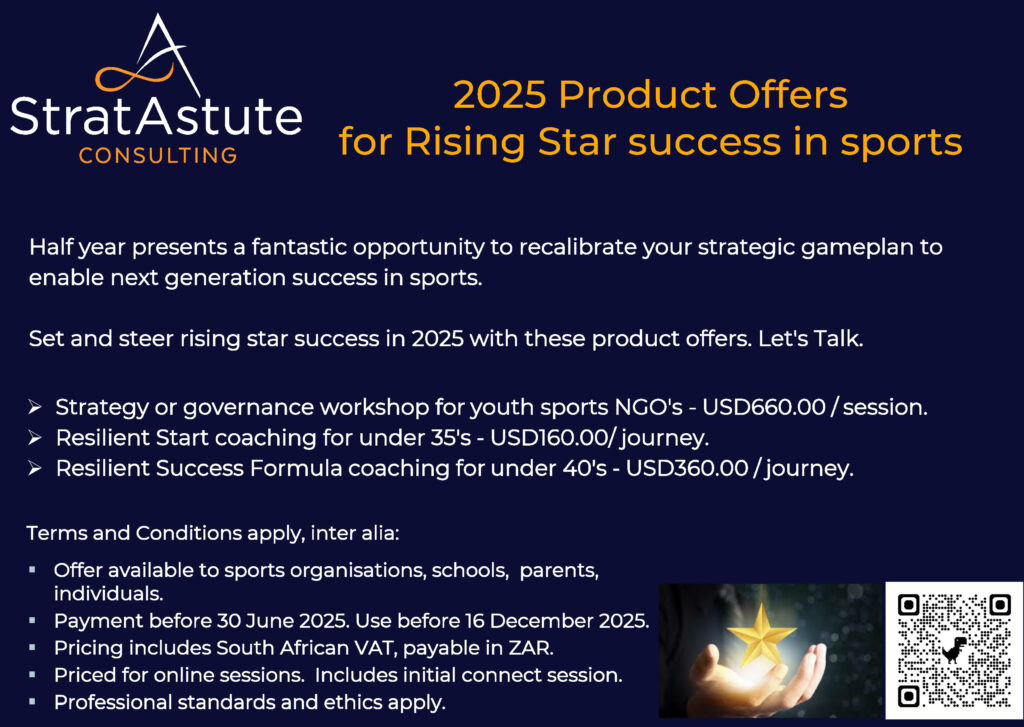
I have been asked this question by a good few people who leave safe harbours in pursuit of Purpose...
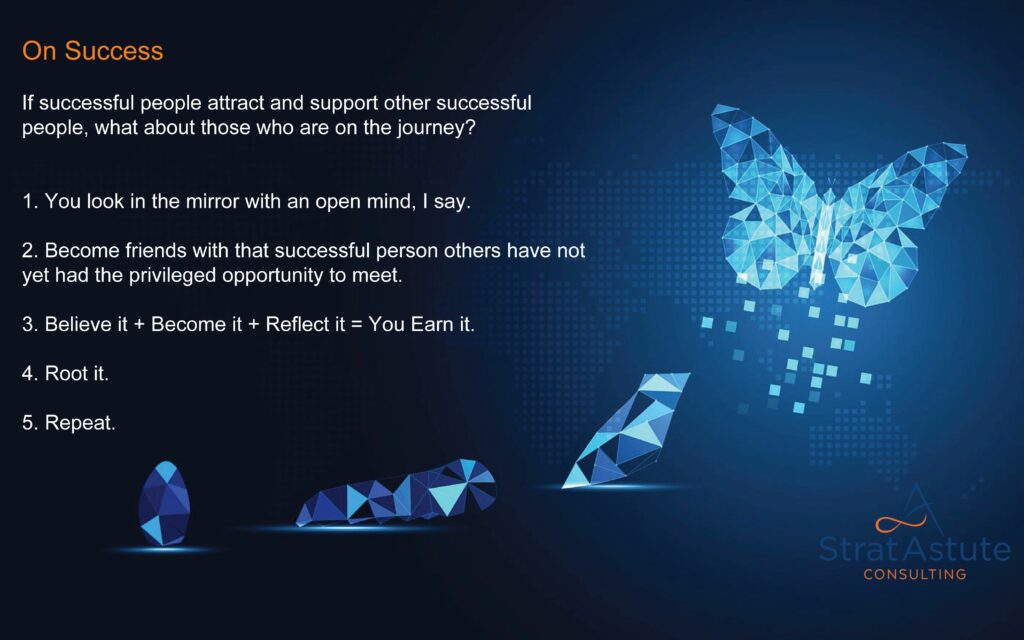
As I type, I am grappling with the unintended ripples of a recent delicate, in-person conversation with an acquaintance. I shared a suggestion that was intended to encourage but instead, was received as being condescending, evoking some anger and hurt. On reflection, perhaps an empathetic listening ear was all the person needed that day. So often we express a perspective, without being fully aware of where someone is at on the textured spectrum of immunity and vulnerability.
Had this been an online conversation, the flow of human chemistry and rapport would have been detached from the start. Yet social media platforms are the new public square that connect billions of users who are geographically spread and socially diverse. Everyone has a voice to exercise freedom of speech online, from leaders, influencers and brands to the unidentified sensation seeker, even if what gets posted undermines or infringes someone else’s human rights. There are no norms and very few filters - insults and hostile messages flow freely, leading to the misuse of social media to spread violent messages and aggressive comments, using offensive language and hurtling hateful speech towards people and groups who represent “the other”. Consistent content moderation is a challenge, but not an excuse.
Social media companies are not playing ball to limit the damage, electing to prioritise profits above people. In 2021, the Facebook Files exposed the lack of online safety controls that placed peoples’ lives and young users’ mental health at risk, with mention of vulnerable communities in Africa. Research reveals that 80% of European Union (EU) citizens have encountered hate speech online, discouraging engagement. Regulators and social media platform owners are at loggerheads. Legislators in the EU and UK are norming. Guidelines and legislation in South Africa are forming. Meanwhile boardroom leaders are staying in their own lanes, fast-tracking digitalisation.
Online abuse in sport is on the rise, with many athletes, employees and volunteers being pinged with threatening, abusive or rude social media messages, termed “flaming”. Healthy competition and victorious results can unite and inspire like the Boks have done for SA. On the opposite end, fanatical rivalry and defeat can over-heat to hate, with or without socio-political undertones. Elite athletes are prime targets of online abuse, irrespective of good or bad performance. The see-saw of applause and abuse gets usurped by online trolls, mostly using anonymous profiles to side-step accountability. The bottom-line is that athletes will leave the sport and fans will lose interest if nothing is done.
Survey trends indicate that more than 40% of professional English football players have experienced abuse on X and 20% of players in the 2023 Women’s World Cup reported social media abuse. The Mbonambi/Curry racial allegation incident proved that language diversity adds complexity, with World Rugby expressing its concern at the level of online abuse directed at both players. Tennis and cricket players too are calling out the online onslaughts they receive from fans. Cyber bullying is rife in e-sports and online gaming, while a criminal element in legalised online sports betting has compelled FBI intervention to protect the lives of targeted US college football players. At the pinnacle of motorsport, Formula One's online reach is growing at speed but with a downside drag. The 2022 "Drive It Out" video campaign called for greater respect to protect driver safety and well-being, following online attacks against seven times World Champion, Lewis Hamilton and former Williams driver, Nicholas Latifi. President of the Fédération Internationale de l'Automobile (FIA), Mohammed Ben Sulayem, reached a point of zero tolerance after female race steward, Silvia Bellot, received numerous online death threats in reaction to her controversial post-race penalty decision. The red flags are up and yes, sports leaders are on guard.
Online toxicity in sport has reached a crisis point and international sports federation administrators are at a pivotal choice point. Online abuse and online hate, in the form of racism, misogyny, sectarianism, bullying and other, dampen the spirit of fair play and must be eradicated urgently to sustain prosperity in sport. Elite athletes and experienced employees represent high-value human capital - constant exposure to online attacks threatens psychological safety, a building block for high performance cultures. Weak governance of online abuse will dilute stakeholder confidence, compromising the overall value proposition in sport. The game is on to prevent this.
Spearheaded by the FIA, the United Against Online Abuse (UAOA) is a global, multi-stakeholder coalition aimed at steering the way forward to tackle all forms of online hate speech in sport, in consultation with governments and NGO’s. With a privileged seat on the UAOA research panel, I aim to make a positive difference through generation of evidence-based research that informs responsible and efficacious combat strategies. In parallel, to engage with national sports federation leaders and affected athletes in South Africa, and interested counterparts in the southern hemisphere, to discuss, understand and raise an awareness on this topic. The FIA and Motorsport South Africa have pledged their green light of support. For shared success, the circle of committed collaborators will need to get bigger so that sport continues to, as Madiba said, “…unite people in a way that little else does”.
Circling back to my earlier reflections, I was reminded that human connections are inherently fragile in a turbulent world, requiring mindful calibration, conversation-by-conversation, chat-by-chat, post-by-post. In person or online, say it with human kindness.
Roshni Gajjar is the Founder and Managing Director of StratAstute Consulting specialising in strategy consulting, resilient success coaching and a director of Future Ones NPC which promotes educational STEM programmes fit for motorsport and allied industries.
FIA Media, Paris | #UnitedAgainstOnlineAbuse
The FIA-led United Against Online Abuse (UAOA) campaign has announced the first recipients of its prestigious Global Research Scholarship.
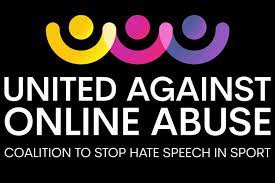
The FIA-led United Against Online Abuse (UAOA) campaign has announced the first recipients of its prestigious Global Research Scholarship.
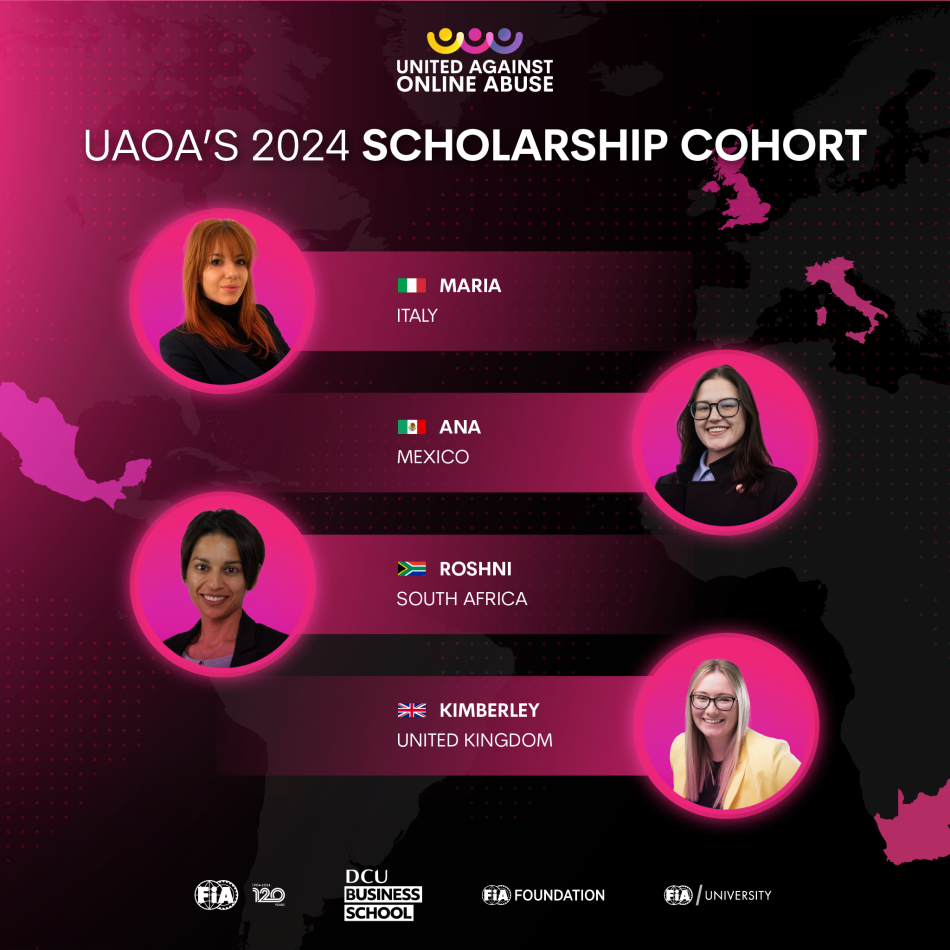
Sport fuels passion and exercises potential. In South Africa, Mandela demonstrated how “sport has the power to change the world... to inspire...to unite people in a way that little else does.” I am honoured and humbled to receive the FIA scholarship award. This opportunity presents a unique privilege to give back; to play my part in the global combat against online abuse. I hope to make a positive difference.”
The four scholars will carry out Master’s by Research at Dublin City University with full funding from the FIA Foundation. Their work will help to improve understanding of online abuse against athletes and officials, providing a strong basis for the UAOA coalition’s ongoing efforts to drive behavioural and regulatory change.
The new scholars are established researchers within their respective fields and bring a wealth of knowledge and experience to the UAOA Research Centre.
Ana Rodríguez Armendariz (Mexico) is a Deputy CMO at the F1 Mexico City Grand Prix. She has completed clinical placements at Hospital Zambrano Hellion, Queen Elizabeth Hospital Birmingham, and TecSalud Zambrano Hellion Hospital.
She said: “This opportunity has deepened my appreciation for our sport's pioneers and their legacy of integrity and excellence. This scholarship allows me to further evolve our sport, particularly in combating online hate speech and fostering an inclusive, enlightened community. Our collective efforts are shaping a transformative legacy beyond the field.”
Kimberley Wyllie (Scotland) joins the programme following Psychology Master’s and Bachelor’s degrees at the University of Stirling and Heriot-Watt University. She currently works as a Managing Editor of the Women in a Man’s Race Magazine and actively participates in the UK Girls on Track programme.
She said: “This opportunity from the FIA and DCU is something I genuinely didn't think I'd be able to participate in. It was one of the things I read about, thought I'd pop in an application anyways, but ultimately thought that there would be someone better out there. It's helped my confidence hugely and shown me that it's amazing what a little bit of self-belief can do. I can't wait to get started and join the United Against Online Abuse family. The only limit is yourself.”
Roshni Gajjar (South Africa) is the Founder and Managing Director of StratAstute, a consulting firm based in South Africa, and Future Ones, a company providing STEM educational programmes for motorsport and allied industries. She has also served in various strategy and stakeholder-focussed roles in the financial services, pharmaceutical, healthcare, sports, and higher education sectors.
Roshni said: “Sport fuels passion and exercises potential. In South Africa, Mandela demonstrated how “sport has the power to change the world... to inspire...to unite people in a way that little else does.” I am honoured and humbled to receive the FIA scholarship award. This opportunity presents a unique privilege to give back; to play my part in the global combat against online abuse. I hope to make a positive difference.”
Maria Iuliano (Italy) works as a press officer at Italian motor sport governing body, ACI Sport SpA.
She said: “Enrolling in the Master’s by Research programme at DCU Business School will enable me to thoroughly investigate online abuse, and I hope to make a significant impact with my work. This is crucial because, through research, we can contribute positively to sports, making it fairer and more inclusive for everyone while continuing to tackle discrimination.”
FIA President, and Founding Patron of UAOA, Mohammed Ben Sulayem, said: “I am delighted to welcome our diverse scholarship group. United Against Online Abuse is a knowledge-led campaign, which puts research and insights at the heart of all its activities. Our scholars’ research will be key in helping us build a strong knowledge base in this historically under-researched area.”
The UAOA Research Centre is partnered with the FIA University programme which promotes knowledge and research sharing across the international FIA network. The Research Centre is committed to driving inclusive global scholarships, which upskill researchers from around the world, particularly those outside the EU.
Principal Investigator for UAOA, Professor David Hassan, said: “I would like to congratulate Kimberley, Ana, Roshni, and Maria for this exceptional achievement. We are looking forward to working with them, and learning from their unique perspectives, knowledge, and experience on the topic.”
Professor Theo Lynn, Associate Dean of Research at DCU Business School, said: “These new scholarships will explore the nature of online abuse in sports and the efficacy of different measures to combat such abuse. By working with the FIA as part of their Global Coalition Against Online Abuse in Sports and fostering a new generation of International researchers working in sports, we aim to contribute to fostering an environment where respect and camaraderie prevail over vitriol and division."
The scholars will begin their studies this month.
For any further media queries, please contact: aridsdillsmith@fia.com
For UAOA queries, please contact: ebourke-consultant@fia.com
by Motorsport South Africa | Feb 27, 2024 | 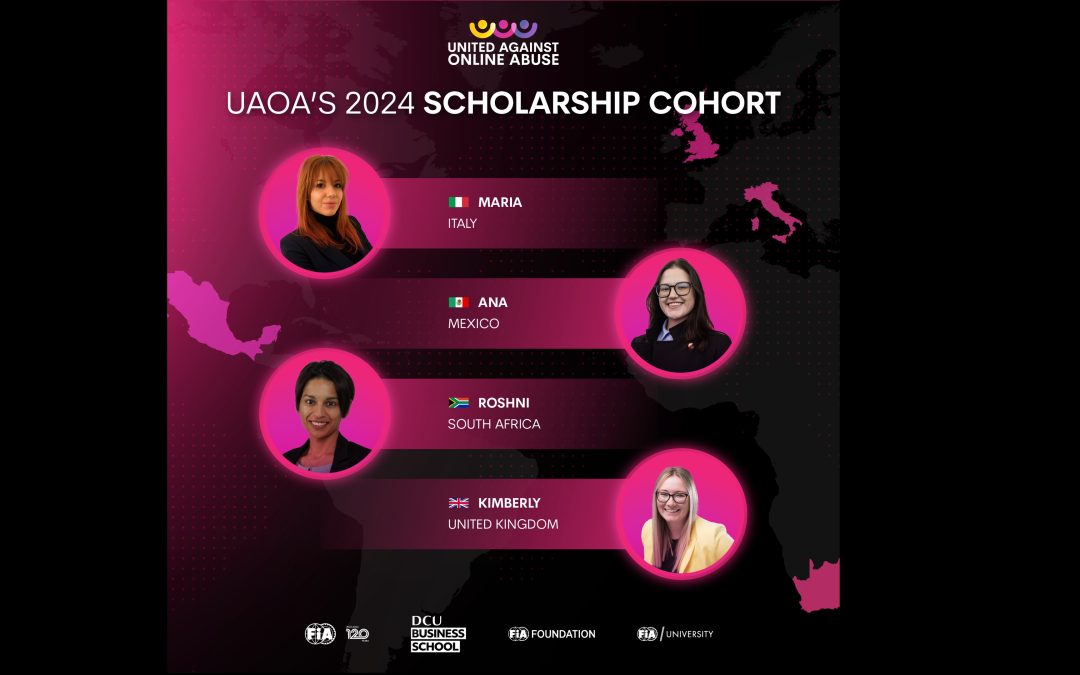
In another proud moment for South African motorsport, Roshni Gajjar from Gqeberha, has been announced as one of the first four recipients of the prestigious Global Research Scholarship, awarded by the FIA in support of its United Against Online Abuse (UAOA) campaign.
The four scholars selected will carry out Masters by Research Programmes at Dublin College University with full funding from the FIA Foundation. Their work will help to improve understanding of online abuse against athletes and officials, providing a strong basis for the UAOA coalition’s ongoing efforts to drive behavioural and regulatory change.
Gajjar will join Ana Rodriguez Armendariz (Mexico), a Deputy CMO at the F1 Mexico City Grand Prix; Kimberley Wyllie (Scotland), managing editor of the Women in a Man’s Race Magazine and active participant in the UK Girls on Track programme and Maria Luliano (Italy) who works as a press officer at Italian motor sport governing body, ACI Sport SpA.
All four are established researchers within their respective fields and bring a wealth of knowledge and experience to the UAOA Research Centre.
FIA President and Founding Partner of UAOA, Mohammed Ben Sulayem, came out strongly last year against the unacceptable levels of online abuse which are creating a blight on the sport. He believes the level of sustained toxicity has reached crisis point and it is time to take a stand. “I am delighted to welcome our diverse scholarship group. United Against Online Abuse is a knowledge-led campaign, which puts research and insights at the heart of all its activities. Our scholars’ research will be key in helping us build a strong knowledge base in this historically under-researched area,” he says.
The UAOA Research Centre is partnered with the FIA University programme which promotes knowledge and research sharing across the international FIA network. The Research Centre is committed to driving inclusive global scholarships, which upskills researchers from around the world, particularly those outside the EU.
Principal Investigator for UAOA, Professor David Hassan, says, “I would like to congratulate Kimberly, Ana, Roshni, and Maria for this exceptional achievement. We are looking forward to working with them, and learning from their unique perspectives, knowledge, and experience on the topic.”
Motorsport South Africa (MSA) is one of 243 Member Clubs. MSA Chairman and FIA Senate member, Anton Roux praised Gajjar on the work she has already done in the industry and the potential contribution her research offers to mitigate online abuse. He said she had the full support of MSA. “Marshals and officials of the sport need to be applauded rather than subjected to any kind of hate speech on social channels so this initiative is to be applauded. The research will enable us to build a greater understanding of the psychological effects of online abuse and inform our strategic approach to tackling the problem in future and protecting participants from this kind of abuse.”
The research will be conducted over two years, commencing this month, through the Dublin City University Business School. The scholarship recipients aim to achieve a Masters by Research (MPhil) on successful completion.
Gajjar, a chartered accountant and strategy consultant, is a strong proponent of positive, purpose-driven success and integrates her philosophy of “Lift as we Rise” into her consulting and performance coaching work which supports STEM career development in motorsport. This closely aligns with MSA’s related objectives.
Commenting on the scholarships, she says she is honoured and humbled to receive the FIA scholarship award and feels extremely privileged to be part of this game-changing research initiative.
“Online abuse deters people from participating, as it infringes on their human rights and compromises the psychological safety of victims, especially women and young people who are avid social media users. Athletes, officials and volunteers will leave if nothing is done. Sport fuels passion and exercises potential. This opportunity presents a unique privilege to give back; to play my part in the global move to combat online abuse. I hope to make a positive difference,” she says.
Adrian Scholtz, MSA Chief Executive Officer, says Gajjar’s selection will add a South African perspective to the FIA’s UAOA global initiative. “We are also highly supportive that the FIA has selected four women. It is commendable that the FIA has initiated this research to develop evidence-based information to steer online abuse combat strategies. Online abuse goes against the spirit of fair play and has no place in sport.”
Some fast facts:
• It is not just athletes that receive abuse. Fans, coaches, commentators, journalists, referees, sporting administrators, among other stakeholders, also regularly receive online abuse as a result of their involvement in the
sporting context
• Ethnic minorities are far more likely to be targeted by, and exposed to, online abuse
• Appearance is the leading cause of online abuse for teenagers and females, being responsible for 38% of such incidents
• About 28% of children around the world have experienced cyberbullying that is racially motivated
• In the 2019/2020 Premier League season, the Professional Footballers Association found that 43% of EPL players had ‘experienced targeted and explicitly racist abuse on public Twitter’
• During the 2022 World Championships, female athletes received 60% of all
online abuse via Twitter and Instagram
• 19,636 posts confirmed as abusive, discriminatory or threatening have been
reported to platforms during FIFA WORLD CUP QATAR 2022
• The ‘United Against Online Abuse’ campaign (UAOA), pioneered by FIA President Mohammed Ben Sulayem, is a research-led coalition aiming to tackle the growing epidemic of online abuse and hate speech in sport.
Prepared on behalf of MSA by Cathy Findlay PR
In a press conference ahead of the 2023 RWC Final, Siya Kolisi said this:
"... people tell us how they feel. People send us videos and tell us (that) this is sometimes the only time they are happy about something is when we play ..."
Q1: As a leader, how often do your people - teams, family, stakeholders, community - see you "playing for performance" vs "working for performance"?
Q2: Is your "tone at the top" inspiring performance or mining performance?
Q3: What would happen if you walked in on Monday heart-first, ready to "play-to-priorities" and invited your team to do the same?
Madiba had that playful twinkle in his eye, despite the odds. His left-field nation building strategy was enabled, astutely, through "play" in 1995. When the game is played beyond the self, commitment to "win" is fuelled by a bigger purpose.

As you watch the Bok and Kiwi gladiators play their hearts out for the 4th Webb Ellis World Cup in 2023, imagine infusing "play" across your fields of leadership influence.
Why? Because effective leadership starts with making people "feel" worthy of success. Leaders today, hold the torch for how that plays out tomorrow.
Roshni Gajjar is the founder of StratAstute Consulting. a boutique consultancy that specialises in strategy, strategy-execution and cultivating a mindset to support resilient success.
I am pleased to be representing StratAstute Consulting as a member of the International Coaching Federation (ICF).
The StratEx 4.0 coaching service stream has evolved organically, through supporting leaders, entrepreneurs and athletes navigate the Covid-related disruptions and uncertainties. I found that coaching is like a game of golf or the sport of marginal gains - the more you and your client show up for practice together, the more you want to learn how to practice better. That's strategy, and fair play, in motion.
My purpose, through StratAstute, is to help organisations, leaders and rising stars to become the best versions of themselves so that they can reach their highest potential, achieve targeted success and make a positive contribution through foresight, purpose-driven actions and a “can-do” mindset.
“It is possible of ordinary people to choose to be extraordinary.”
- Elon Musk
I am excited to work with existing and new clients, to cultivate resilient performance and to enable them to reach their vision of success. Let's Talk.
Roshni Gajjar is a certified Performance Coach and a member of the ICF. She is an experienced Chartered, Strategy Consultant and Board-level leader. She has offers +20 years’ executive-level experience to her clients, served in the advisory/assurance, automotive, consulting, healthcare, higher education, insurance sectors and pharmaceutical sectors.
Leaders/Parents/Adults in general: if you have your heads buried in the sand, navigating draining systemic issues, rise out!
The wars outside are causing wars inside us and crevasses between us, weakening inter-generational cohesion.
The next generation needs a pull strategy from the current generation. Else all growth, all progress, stops. Borrowing some wise words from my brother which speaks to remaining relatable:
"Avoid getting too tense. Else you'll become past tense!"
Think long term, practice mindful resiliency. Your words, thoughts, opinions, habits and actions all carry impressionable power. Use it responsibly.
There is a fine line between contextualised realism and constant pessimism. The latter causes chronic inertia. Aim for practical forward-momentum, no matter how big or small the marginal gains.
This has been my key take-away in a week of multi-purpose, inter-generational conversations with 4 to 94 year olds about the future, as we see it through today's window.
What legacy do you want to create? Back cast.
Following the stories of sudden collapses making headlines in March involving SVB, Credit Suisse, Transaction Capital and others that are likely to follow, I share high-level reflections with reference to two critical leadership tools, being strategy and risk management.
1) Strategy is a game-plan with a 3 to 20 year time horizon in the case of large companies; let's say 3 to 5 in smaller entities/focussed projects. For governments, up to 50 years.
2) Risk management (verb) supports the execution of that game-plan w.r.t evolving internal and external factors - it must work consistently during both good times and bad times. Surprise/ shock events means the risk was not identified or fairly prioritised or the CRO or was not in the room. Of course, black swans do land, albeit only occasionally and cyclically in some disciplines. What about repeat events - 2001, 2008, now 2023 and ESG scandals in between.
3) Companies that apply inconsistent or ineffective risk management will fail and fall eventually - the game-plan has a faulty scoreboard and offers no practical adaptation levers. Kicking the can down the road simply deepens the cracks in the lifeboat.
4) Banking on external factors and systemic forces to compensate for poor risk management culture is like captaining a damaged ship with arms folded. Hubris and irresponsible. High uncertainty requires high risk monitoring and consistent key stakeholder engagement. Keep the CROs close and allow them to be brutally objective about the facts and scenarios.
5) During change, adaptation or turbulence, stakeholders must remain well informed of how the game is being played, in simple language, so that they can clearly evaluate the upside and downside of their involvement, based on what they choose to hear and buy into. Vital in an age of information overload and high polarisation. Effective investor/stakeholder relations needs objective technical experts who communicate with facts. PRO and marketing are different.
Turbulence and disruption are the new normal, until the 4.0 foundation is set. We are seeing various systems in adaptation/ transition phase, across sectors. We have also entered a new AI era which brings in new complexity. Yet old risk events repeat. Chaos looming?
What is the capacity for critical thinking within our leadership teams and structures? Can current thinking help direct a new trajectory that delivers prosperity? If not, what practical changes can we make now to avoid a foreseeable crash, collapse or corporate scandal in our spheres of influence - as business leaders, influencers and educators/mentors? This is surely a key layer of the 4.0 foundation?
Keywords: Leadership, Resilience, Strategy Execution, Sustainability, Inclusion
Of the snippets I have heard of the Spare interview, my contextual question is this: Does Prince Harry's yearning for a "family" vs an institution represent an underlying generational trauma experienced by the Gen Y / Gen Z's or those who feel unseen / unheard / unrecognised?
As leaders at home, in society and in organisations, I believe we must engage in multi-generational talks with the cohort the WEF calls "the disillusioned youth", to understand their root issues so that we can co-create and unlock a cohesive, future culture of living, leading and working. Else the next generation is unlikely to thrive - relational locks exacerbate conflict and conflict-ridden patterns; nothing prospers. Resilience atrophies.
Everyone has a part to play in any future scenario where shared respect between people fuels a shared vision, beyond individual goals/ agendas. Leaders must enable this across their spheres of influence and intentionally.
Perhaps a leadership priority in the New Normal is about back-to-basics when we choose, where we have influence, to actively invest in those significant, high-quality connections and to create space for relevant, meaningful conversations.